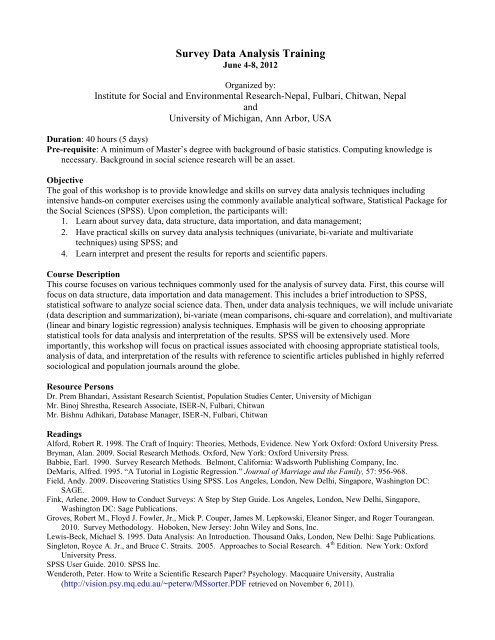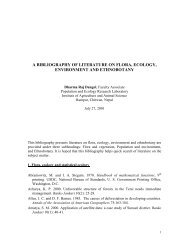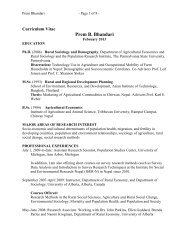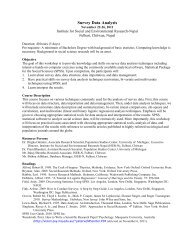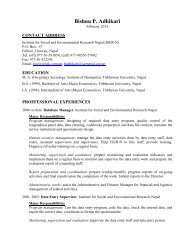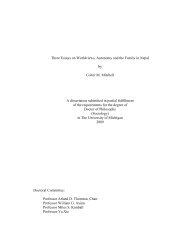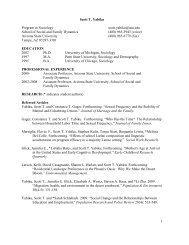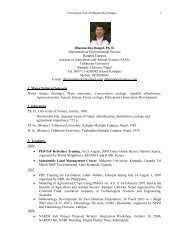Survey Data Analysis - Institute for Social and Environmental ...
Survey Data Analysis - Institute for Social and Environmental ...
Survey Data Analysis - Institute for Social and Environmental ...
You also want an ePaper? Increase the reach of your titles
YUMPU automatically turns print PDFs into web optimized ePapers that Google loves.
<strong>Survey</strong> <strong>Data</strong> <strong>Analysis</strong> Training<br />
June 4-8, 2012<br />
Organized by:<br />
<strong>Institute</strong> <strong>for</strong> <strong>Social</strong> <strong>and</strong> <strong>Environmental</strong> Research-Nepal, Fulbari, Chitwan, Nepal<br />
<strong>and</strong><br />
University of Michigan, Ann Arbor, USA<br />
Duration: 40 hours (5 days)<br />
Pre-requisite: A minimum of Master’s degree with background of basic statistics. Computing knowledge is<br />
necessary. Background in social science research will be an asset.<br />
Objective<br />
The goal of this workshop is to provide knowledge <strong>and</strong> skills on survey data analysis techniques including<br />
intensive h<strong>and</strong>s-on computer exercises using the commonly available analytical software, Statistical Package <strong>for</strong><br />
the <strong>Social</strong> Sciences (SPSS). Upon completion, the participants will:<br />
1. Learn about survey data, data structure, data importation, <strong>and</strong> data management;<br />
2. Have practical skills on survey data analysis techniques (univariate, bi-variate <strong>and</strong> multivariate<br />
techniques) using SPSS; <strong>and</strong><br />
4. Learn interpret <strong>and</strong> present the results <strong>for</strong> reports <strong>and</strong> scientific papers.<br />
Course Description<br />
This course focuses on various techniques commonly used <strong>for</strong> the analysis of survey data. First, this course will<br />
focus on data structure, data importation <strong>and</strong> data management. This includes a brief introduction to SPSS,<br />
statistical software to analyze social science data. Then, under data analysis techniques, we will include univariate<br />
(data description <strong>and</strong> summarization), bi-variate (mean comparisons, chi-square <strong>and</strong> correlation), <strong>and</strong> multivariate<br />
(linear <strong>and</strong> binary logistic regression) analysis techniques. Emphasis will be given to choosing appropriate<br />
statistical tools <strong>for</strong> data analysis <strong>and</strong> interpretation of the results. SPSS will be extensively used. More<br />
importantly, this workshop will focus on practical issues associated with choosing appropriate statistical tools,<br />
analysis of data, <strong>and</strong> interpretation of the results with reference to scientific articles published in highly referred<br />
sociological <strong>and</strong> population journals around the globe.<br />
Resource Persons<br />
Dr. Prem Bh<strong>and</strong>ari, Assistant Research Scientist, Population Studies Center, University of Michigan<br />
Mr. Binoj Shrestha, Research Associate, ISER-N, Fulbari, Chitwan<br />
Mr. Bishnu Adhikari, <strong>Data</strong>base Manager, ISER-N, Fulbari, Chitwan<br />
Readings<br />
Al<strong>for</strong>d, Robert R. 1998. The Craft of Inquiry: Theories, Methods, Evidence. New York Ox<strong>for</strong>d: Ox<strong>for</strong>d University Press.<br />
Bryman, Alan. 2009. <strong>Social</strong> Research Methods. Ox<strong>for</strong>d, New York: Ox<strong>for</strong>d University Press.<br />
Babbie, Earl. 1990. <strong>Survey</strong> Research Methods. Belmont, Cali<strong>for</strong>nia: Wadsworth Publishing Company, Inc.<br />
DeMaris, Alfred. 1995. “A Tutorial in Logistic Regression.” Journal of Marriage <strong>and</strong> the Family, 57: 956-968.<br />
Field, Andy. 2009. Discovering Statistics Using SPSS. Los Angeles, London, New Delhi, Singapore, Washington DC:<br />
SAGE.<br />
Fink, Arlene. 2009. How to Conduct <strong>Survey</strong>s: A Step by Step Guide. Los Angeles, London, New Delhi, Singapore,<br />
Washington DC: Sage Publications.<br />
Groves, Robert M., Floyd J. Fowler, Jr., Mick P. Couper, James M. Lepkowski, Eleanor Singer, <strong>and</strong> Roger Tourangean.<br />
2010. <strong>Survey</strong> Methodology. Hoboken, New Jersey: John Wiley <strong>and</strong> Sons, Inc.<br />
Lewis-Beck, Michael S. 1995. <strong>Data</strong> <strong>Analysis</strong>: An Introduction. Thous<strong>and</strong> Oaks, London, New Delhi: Sage Publications.<br />
Singleton, Royce A. Jr., <strong>and</strong> Bruce C. Straits. 2005. Approaches to <strong>Social</strong> Research. 4 th Edition. New York: Ox<strong>for</strong>d<br />
University Press.<br />
SPSS User Guide. 2010. SPSS Inc.<br />
Wenderoth, Peter. How to Write a Scientific Research Paper? Psychology. Macquaire University, Australia<br />
(http://vision.psy.mq.edu.au/~peterw/MSsorter.PDF retrieved on November 6, 2011).
Day 1 (4 June 2012)<br />
<strong>Survey</strong> <strong>Data</strong> <strong>Analysis</strong><br />
June 4-8, 2012<br />
Training Schedule<br />
Activity/Topic Lead Person(s) Readings (Required) Remarks (Reading are<br />
Time<br />
recommended)<br />
07:30: 08:00<br />
08:00-08:30<br />
Trainee arrive at ISER-N Campus in Fulbari, Chitwan<br />
Registration <strong>and</strong> Breakfast<br />
-Krishna<br />
-Krishna<br />
08:30-10:00 Introductions<br />
-Binoj<br />
Distribution of course<br />
Welcome <strong>and</strong> introduction to ISER-N<br />
-Dr. Dangol<br />
outline/ course pack<br />
Overview of the workshop<br />
-Prem<br />
Briefing on course pack<br />
-Prem/Bishnu<br />
10:00-10:15 Tea/Coffee<br />
10:15-11:00 <strong>Survey</strong> research, survey lifecycle <strong>and</strong> survey errors -Prem -Groves et al. 2010<br />
(Ch. 2; Pp. 39-65)<br />
-Fink 2009 (Pp. 1-12)<br />
-Babbie 1990<br />
(Ch. 4, Pp. 51-64)<br />
11:00-12:00 An introduction to large scale surveys in Nepal<br />
Census<br />
Nepal Demographic Health <strong>Survey</strong>s (DHS)<br />
Nepal Living St<strong>and</strong>ard <strong>Survey</strong> (NLSS)<br />
Nepal Labor Force <strong>Survey</strong> (NLFS)<br />
Multiple Indicators Cluster <strong>Survey</strong> (MICS)<br />
Others (Nepal Adolescent <strong>and</strong> Young Adult (NAYA)<br />
<strong>Survey</strong>)<br />
12:00-13:00 Lunch<br />
-Prem
Day 1……<br />
Activity/Topic Lead Person(s) Readings (Required) Remarks (Reading are<br />
Time<br />
recommended)<br />
13:00-14:00 Chitwan Valley Family Study (CVFS)<br />
Overview of study design <strong>and</strong> objectives<br />
The research programs<br />
-Prem/Binoj<br />
Overview of community, household, individual,<br />
<strong>and</strong> environmental (flora <strong>and</strong> l<strong>and</strong> use) data<br />
14:00-15:00 -Introduce CVFS data CD <strong>and</strong> codebook<br />
-SPSS Environment<br />
15:00-15:15 Tea/Coffee<br />
15:15-16:45 Discussion on research question<br />
The research process <strong>and</strong> research question<br />
Discuss possible research questions (that can be<br />
answered using cross sectional vs. longitudinal data)<br />
Exercise: Discuss one or two examples of research<br />
questions from published papers<br />
Exercise<br />
Ask participants to identify a research question of interest<br />
that can be answered by using any one (household or<br />
individual) CVFS data set or their own.<br />
16:45-17:00 Wrap-up of Day 1<br />
-Prem/Bishnu<br />
-Prem<br />
-Prem -Lewis-Beck 1995 (P 3 )<br />
-Al<strong>for</strong>d 1998 (Ch 2)<br />
Discuss at least one in<br />
detail<br />
-Singleton <strong>and</strong> Straits<br />
2005<br />
(Ch. 4; Pp. 107-112).<br />
-Bryman 2009<br />
(Ch. 3 Pp. 69-74).<br />
Project Work<br />
This will be the main<br />
project work.<br />
Note: Participants are encouraged to use lab/training hall facilities if they require additional practice time after the regular session<br />
(after 5pm). Instructors will be available <strong>for</strong> facilitation.
Day 2 (5 June 2012)<br />
Time Activity/Topic Lead Person(s) Readings (Required) Remarks (Reading are<br />
recommended)<br />
08:30-09:00 Review of Day 1<br />
Discussion on research question (Project work)<br />
09:00-10:00 Levels of measurement (including types of variables)<br />
In class exercise: Variables<br />
-Provide a list of variables (from CVFS or DHS data)<br />
with their measurement units (also a descriptive statistics<br />
table from a journal article). Discuss their levels of<br />
measurements.<br />
10:00-10:15 Tea/Coffee<br />
-Prem/Bishnu -Singleton <strong>and</strong> Straits 2005<br />
(Pp.84-112; 126-130)<br />
10:15-11:00 Steps in data creation -Prem/Bishnu -Singleton <strong>and</strong> Straits 2005<br />
(Pp.84-112; 126-130)<br />
Project Work<br />
Identification of<br />
dependent <strong>and</strong><br />
independent variables<br />
11:00-12:00 SPSS Tutorial 1: Introduction to the SPSS System (with<br />
h<strong>and</strong>s-on): Overview of SPSS windows (data view <strong>and</strong><br />
variable view, syntax window, <strong>and</strong> output window)<br />
-File structures<br />
-Coding <strong>and</strong> entering data into SPSS<br />
-Importing data into SPSS<br />
12:00-13:00 Lunch<br />
-Prem/Binoj/Bishnu<br />
-IBM SPSS Statistics 19. Brief<br />
Guide (Electronic copy)<br />
SPSS-H<strong>and</strong>s on Exercise<br />
13:00-14:00 SPSS Tutorial 1: …contd.<br />
-Coding <strong>and</strong> entering data into SPSS<br />
-Importing data into SPSS<br />
14:00-15:00 SPSS Tutorial 2.1:Exploring data with SPSS<br />
-Filter (select if), sort <strong>and</strong> merge functions<br />
-Syntax basics<br />
15:00-15:15 Tea/Coffee<br />
-Prem/Binoj/Bishnu<br />
-Prem/Binoj/Bishnu<br />
-IBM SPSS Statistics 19. Brief<br />
Guide (Electronic copy)<br />
-IBM SPSS Statistics 19. Brief<br />
Guide (Electronic copy)<br />
SPSS-H<strong>and</strong>s on Exercise<br />
SPSS-H<strong>and</strong>s on Exercise<br />
15:15-16:45 SPSS Tutorial 2.2:Exploring data with SPSS<br />
-<strong>Data</strong> trans<strong>for</strong>mations (recodes <strong>and</strong> compute functions)<br />
-Prem/Binoj/Bishnu<br />
-IBM SPSS Statistics 19. Brief<br />
Guide (Electronic copy)<br />
SPSS-H<strong>and</strong>s on Exercise<br />
16:45-17:00 Wrap-up of Day 2
Day 3 ( 6 June 2012)<br />
Time Activity/Topic Lead Person(s) Readings (Required) Remarks (Reading are<br />
recommended)<br />
08:30-09:00 Review of Day 2 -Prem<br />
09:00-10:00 An introduction to survey data analysis (analysis<br />
techniques by levels of measurement)<br />
10:00-10:15 Tea/Coffee<br />
10:15- 11:00 SPSS Tutorial 3: Univariate <strong>Analysis</strong><br />
Frequencies <strong>and</strong> percentages<br />
Central tendency (mean, mode, median)<br />
Dispersion (range <strong>and</strong> st<strong>and</strong>ard deviation)<br />
Graphs<br />
11:00- 12:00 SPSS Tutorial 3: Univariate <strong>Analysis</strong>…contd<br />
1. Provide a descriptive statistics table from a journal<br />
article <strong>and</strong> ask participants to interpret the coefficients<br />
2. Provide a list of variables <strong>and</strong> ask participants to run<br />
these procedures <strong>and</strong> interpret the results.<br />
12:00-13:00 Lunch<br />
13:00-15:00 SPSS Tutorial 4: Bi-variate <strong>Analysis</strong><br />
Concept on hypothesis testing<br />
Mean comparisons<br />
1. Provide bi-variate results from a journal article, ask<br />
participants to identify the type of analysis, <strong>and</strong><br />
interpret coefficients (including hypothesis testing)<br />
2. Provide variables <strong>and</strong> ask participants to run these<br />
procedures <strong>and</strong> interpret the results<br />
15:00-15:15 Tea/Coffee<br />
15:15-16:45 SPSS Tutorial 5: Bi-variate <strong>Analysis</strong><br />
Association: Table <strong>and</strong> chi-square<br />
Pearson correlation<br />
1. Provide bi-variate results from a journal article, ask<br />
participants to identify the type of analysis, <strong>and</strong><br />
interpret coefficients (including hypothesis testing)<br />
2. Provide variables <strong>and</strong> ask participants to run these<br />
procedures <strong>and</strong> interpret the results<br />
16:45-17:00 Wrap-up of Day 3<br />
-Prem -Fink 2009 (Pp. 77-98)<br />
- Prem/Binoj -IBM SPSS Statistics 19. Brief<br />
Guide (Electronic copy)<br />
-IBM SPSS Statistics Base 19<br />
(Electronic copy)<br />
- Prem/Binoj -Fink 2009 (Pp. 77-98) Project Work<br />
Ask participants to run<br />
these procedures <strong>and</strong><br />
interpret the results.<br />
SPSS-H<strong>and</strong>s on Exercise<br />
-Prem -IBM SPSS Statistics Base 19<br />
(Electronic copy)<br />
-Fink 2009 (Pp. 77-98)<br />
-Prem -IBM SPSS Statistics Base 19<br />
(Electronic copy)<br />
Project Work<br />
Ask participants to run<br />
these procedures <strong>and</strong><br />
interpret the results.<br />
SPSS-H<strong>and</strong>s on Exercise<br />
Project Work<br />
Ask participants to run<br />
these procedures <strong>and</strong><br />
interpret the results.<br />
SPSS-H<strong>and</strong>s on Exercise
Day 4 (7 June 2012)<br />
Time Activity/Topic Lead Person(s) Readings (Required) Remarks (Reading are<br />
recommended)<br />
08:30-09:00 Review of Day 3 Prem<br />
09:00-10:00 SPSS Tutorial 6: Multivariate <strong>Analysis</strong><br />
Linear (Multiple) Regression (Ordinary Least Square<br />
(OLS) Technique)<br />
1. Provide a table with OLS estimates from a journal<br />
article <strong>and</strong> ask participants to interpret coefficients.<br />
2. Provide variables <strong>and</strong> ask participants to run these<br />
procedures <strong>and</strong> interpret the results.<br />
10:00-10:15 Tea/Coffee<br />
10:15-12:00 SPSS Tutorial 6: Multivariate <strong>Analysis</strong>…OLS …contd<br />
12:00-13:00 Lunch<br />
Prem -Lewis-Beck, 1995;(Ppp. 41-<br />
72)<br />
-IBM SPSS Statistics Base 19<br />
(Electronic copy)<br />
-Chapter 7, Multiple<br />
Regression (SPSS)<br />
Project Work<br />
Ask participants to run<br />
these procedures <strong>and</strong><br />
interpret the results.<br />
SPSS-H<strong>and</strong>s on Exercise<br />
13:00-15:00 SPSS Tutorial 7: Logistic (Binary) Regression<br />
1. Provide a table with results from a journal article <strong>and</strong><br />
discuss the results<br />
2. Provide variables <strong>and</strong> ask participants to run these<br />
procedures <strong>and</strong> interpret the results<br />
15:00-15:15 Tea/Coffee<br />
Prem -DeMaris. 1995<br />
-IBM SPSS Regression 19<br />
(Electronic copy)<br />
Project Work<br />
Ask participants to run<br />
these procedures <strong>and</strong><br />
interpret the results.<br />
SPSS-H<strong>and</strong>s on Exercise<br />
15:15-16:45 SPSS Tutorial 7: Logistic (Binary) Regression….contd Prem<br />
16:45-17:00 Wrap-up of Day 4<br />
SPSS-H<strong>and</strong>s on Exercise
Day 5 (8 June 2012)<br />
Time Activity/Topic Lead Person(s) Readings (Required) Remarks (Reading<br />
are recommended)<br />
08:30-10:00 - Review of Day 4<br />
10:00-10:15 Tea/Coffee<br />
-Writing <strong>and</strong> publication<br />
-Research ethics<br />
-Prem<br />
-Prem/Bishnu<br />
-Singleton <strong>and</strong> Straits 2005<br />
(Ch 17)<br />
-Groves et al., 2010<br />
(Pp. 371-403.)<br />
-Wenderoth<br />
(Psychology)<br />
10:15-12:00 Participants will work on their project. Participants will<br />
make univariate, bi-variate <strong>and</strong> multivariate tables, <strong>and</strong><br />
interpret those results.<br />
12:00-13:00 Lunch<br />
- Prem/Binoj/Bishnu Each participant will<br />
prepare (power point)<br />
presentation based on<br />
the results.<br />
13:00-15:00 Presentations<br />
15:00-15:15 Tea/Coffee<br />
15:15-10:00 Questions, exploration, <strong>and</strong> evaluations - Prem/Binoj/Bishnu<br />
16:00-17:00 Closing -Dr. Dangol<br />
***The End***


